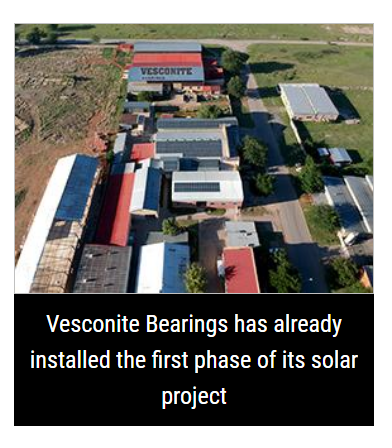Welcome to Sino Bearings web
24x7 HOTLINE:+86-28-81454188

 NEWS
NEWS
Polymer bearing material producer, Vesconite Bearings, intends to take advantage of South Africa’s high levels of solar radiation to power some of its most power-hungry processes. The company has already installed the first phase of its solar project, comprising 14 strings of 18 x 350W Canadian solar panels and a 66kW Schneider Electric inverter.
The system produces 65kWh at peak, with the inverter supplying 60kW to the factory’s Extrusion Department, which makes its Vesconite and Vesconite Hilube wear-resistant self-lubricating hollow bars and rods.
As such, three quarter of the department’s electricity needs of 80kW/h, are provided for during peak sunlight hours, with a smaller proportion of the department’s electricity needs being catered for from dawn and after 12 noon.
“This is a 60 kW on-demand grid-tied system,” explains Extrusion Head Marius Du Plooy. “This means that the inverter is synchronised with the municipality’s supply and we use what we produce during day time,” he notes.
Unfortunately, the municipality in which Vesconite Bearings is located does not allow energy producers to sell excess power back to it.
It is not yet cost effective to use storage batteries, so the full energy-production-capacity of the solar system is not harnessed and the company is investigating how to expand the usage of the system.
Vesconite’s CEO, Dr Jean-Patrick Leger, is pleased that the company has been able to harness the power of the sun for its extrusion processes and will soon have “Produced by Solar Power” stickers printed for the company’s extrusions produced during the "solar shift".
Extruders tend to be power intensive since energy is needed for the barrel heaters that melt the polymers; the screw drives that propel the polymer material through the extruders; and the digital control systems. However, the location of the company in sunny South Africa, with more than 2,500 hours of sunshine a year and solar-radiation levels of between 4.5 and 6.5 kWh/m2 per day is a clear benefit.
“This is one thing that small businesses can do to save money, make themselves less reliant on State-provided electricity, and reduce their impact on the environment,” says Leger.